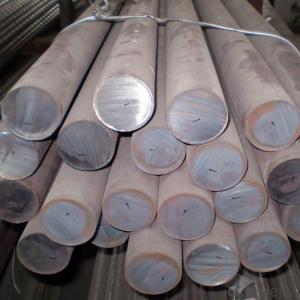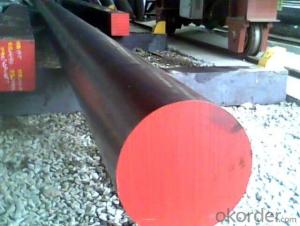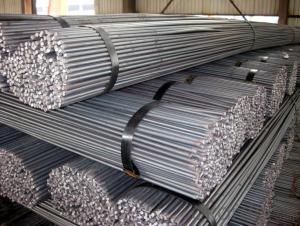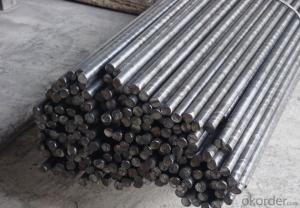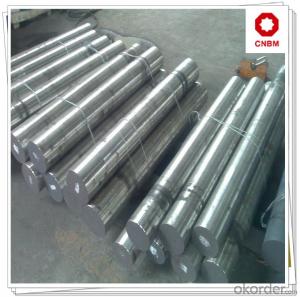Alloy Steel Round Bars 42CrMo4
- Loading Port:
- Shanghai
- Payment Terms:
- TT OR LC
- Min Order Qty:
- 30 m.t.
- Supply Capability:
- 120000 m.t./month
OKorder Service Pledge
OKorder Financial Service
You Might Also Like
Alloy Steel Round Bars 42CrMo4
Specification
1, Diameter: 8mm-250mm rounds
5mm-9mm rods
2, Length: 2m, 3m, 5.8m, 6m or customized
3, Standard: GB, ASTM, AISI, SAE, DIN, JIS, EN
OEM technology - send detailed technical parameters for accurate quotation.
2, Produce Process: smelt iron - EAF smelt billet - ESR smelt billet -
hot rolled or forged to get the steel round bar and plate
3, Heat Treatment: annealing, normalizing, tempering, quenching
4, Surface Treatment: Black, Polished, Galvanized
5, Quality Assurance: We accept third party inspection for all orders.
You can ask testing organizations such as SGS, BV, etc. to test our products before shipping.
Equivalent grades
| GB | DIN | AISI | JIS |
| 42CrMo | 1.7225 | 4140 | SCM440 |
Chemical Composition
| C | Si | Mn | Cr | Mo | P | S |
| 0.38-0.43 | 0.40max | 0.60-0.90 | 0.90-1.20 | 0.15-0.30 | ≤0.035 | ≤0.035 |
Products Show
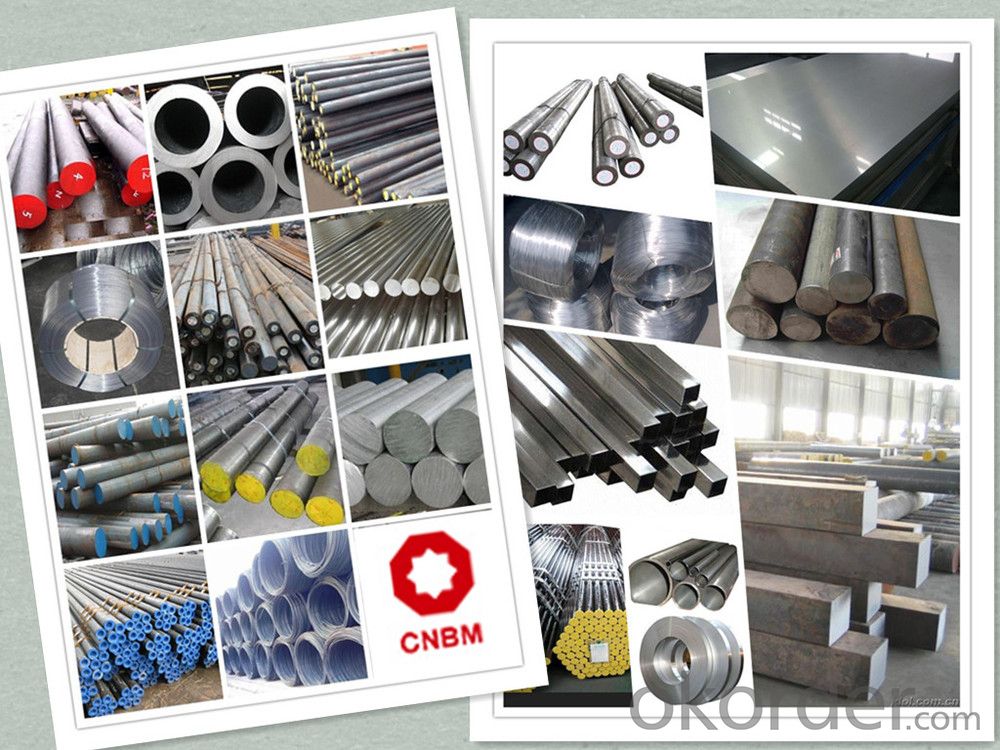
Application
| Carbon Steel | Mold bottom, Plastic mold, Construction machinery parts Automobile parts, Security grills, Screens, Construction |
| Bearing Steel | Aerospace, Navigation, Nuclear energy, Chemical industry Electronic information, Petrochemical, Instrument and meter Transportation |
| Cr-Mo Steel | Mechanism & Fasteners gear, Stressed components for vehicles Engines and machines, Parts of larger cross-section |
| Gear Steel | All kinds of gears, Statically and dynamically stressed component for vehicles Engines and machine, Larger cross-section parts, Crankshafts |
Work Shop
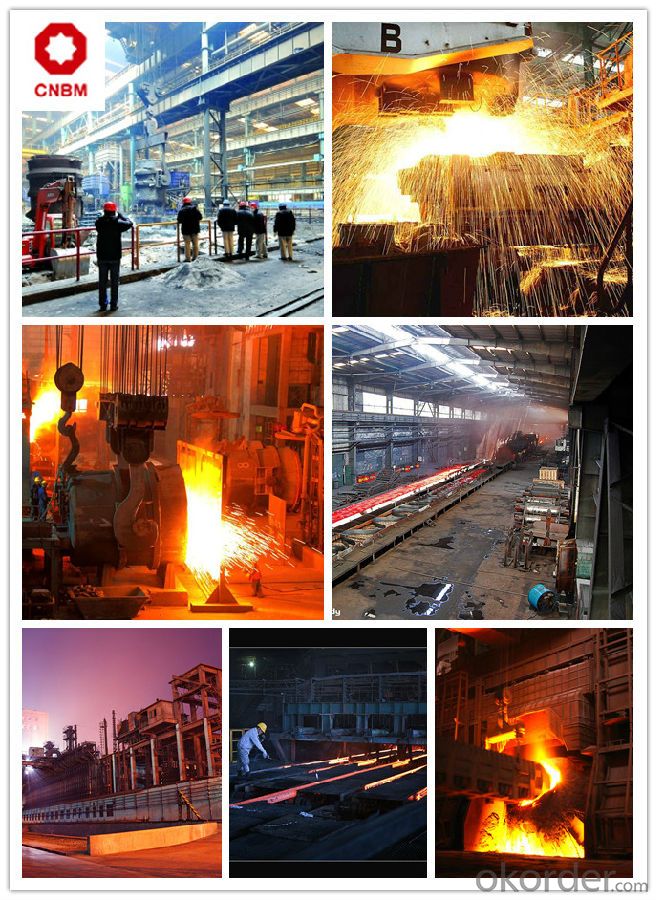
Company Information
CNBM International Corporation is the most important trading platform of CNBM group.
Whith its advantages, CNBM International are mainly concentrate on Cement, Glass, Iron and Steel, Ceramics industries and devotes herself for supplying high qulity series of refractories as well as technical consultancies and logistics solutions.

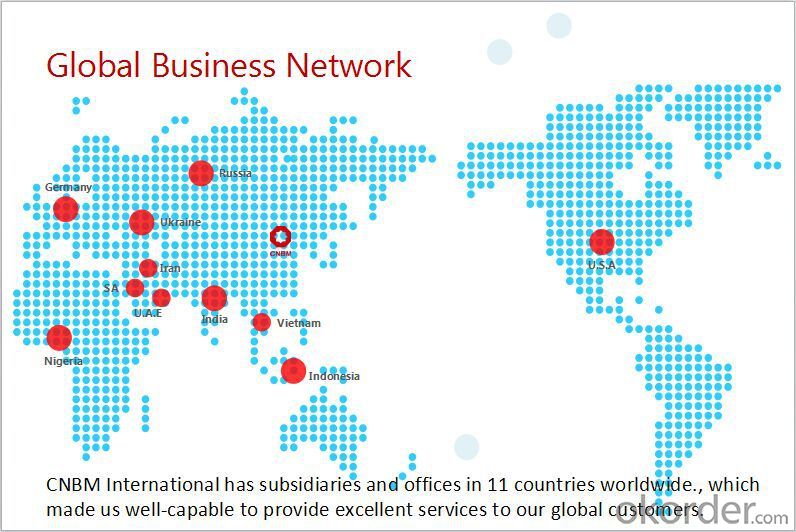
FAQ
1, Your advantages?
professional products inquiry, products knowledge train (for agents), smooth goods delivery, excellent customer solution proposale
2, Test & Certificate?
SGS test is available, customer inspection before shipping is welcome, third party inspection is no problem
3, Factory or Trading Company?
CNBM is a trading company but we have so many protocol factories and CNBM works as a trading department of these factories. Also CNBM is the holding company of many factories.
4, Payment Terms?
30% TT as deposit and 70% before delivery.
Irrevocable L/C at sight.
5, Trading Terms?
EXW, FOB, CIF, FFR, CNF
6, After-sale Service?
CNBM provides the services and support you need for every step of our cooperation. We're the business partner you can trust.
For any problem, please kindly contact us at any your convenient time.
We'll reply you in our first priority within 24 hours.
Packaging & Delivery
1, Packaging: seaworthy package or as required
2, Delivery: 35-45 days or based on quantity
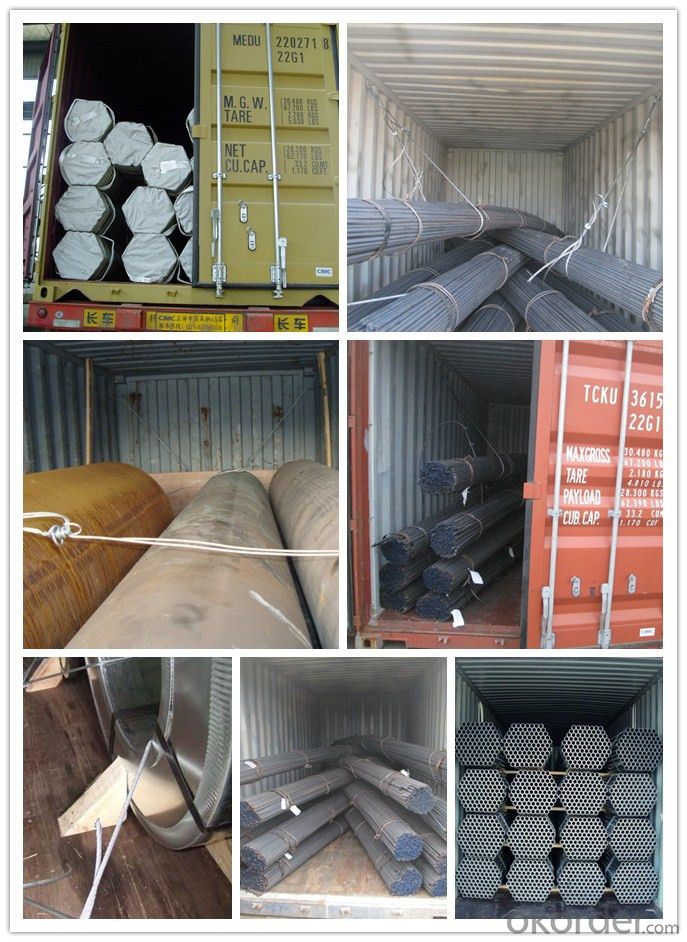
- Q:What are the different treatments available for steel round bars?
- There are several different treatments available for steel round bars, depending on the desired properties and applications. Some common treatments include: 1. Heat Treatment: This process involves heating the steel round bars to a specific temperature and then cooling it rapidly or slowly to alter its mechanical properties. Heat treatment can improve hardness, strength, toughness, and resistance to wear and corrosion. 2. Quenching and Tempering: Quenching involves rapidly cooling the heated steel round bars in a liquid medium, such as water or oil, to increase hardness. Tempering follows quenching and involves reheating the steel to a lower temperature to reduce brittleness and increase toughness. 3. Surface Hardening: This treatment is used to increase the hardness of the outer layer of the steel round bar while maintaining a tough and ductile core. Common surface hardening methods include carburizing, nitriding, and induction hardening. 4. Cold Working: Cold working involves deforming the steel at room temperature through processes like rolling, drawing, or extrusion. This treatment can increase the strength and hardness of the steel round bars, while also improving dimensional accuracy and surface finish. 5. Coating: Applying a protective coating to steel round bars can enhance their resistance to corrosion and wear. Common coatings include zinc plating, galvanizing, and various types of paint or epoxy coatings. 6. Shot Blasting: This treatment involves shooting small metallic or abrasive particles at high speeds onto the surface of the steel round bars. Shot blasting can remove contaminants, scale, and rust, resulting in a clean and polished surface. It's important to note that the choice of treatment depends on the specific requirements of the steel round bars and the intended application. Consulting with experts or metallurgists is recommended to determine the most suitable treatment for a particular situation.
- Q:Can steel round bars be used for making wheel hubs?
- Yes, steel round bars can be used for making wheel hubs. Steel round bars are a common choice for manufacturing wheel hubs due to their strength and durability. The round shape of the bars allows for easy machining and shaping into the required design for the wheel hub. Steel is known for its high tensile strength and resistance to wear and tear, making it an ideal material for wheel hubs that need to withstand the heavy loads and constant rotation of the wheels. Additionally, steel is readily available and relatively cost-effective compared to other materials, making it a popular choice in the automotive industry for wheel hub production.
- Q:What are the different types of steel round bar alloys for improved hardness and strength?
- Some examples of steel round bar alloys that are known for improved hardness and strength include 4140, 4340, and 8620. These alloys are commonly used in industries such as automotive, aerospace, and construction due to their exceptional mechanical properties.
- Q:What are the different testing methods for steel round bars?
- Steel round bars undergo various testing methods to assess their quality and performance. These methods encompass: 1. Tensile Testing: This method determines the strength and elasticity of steel round bars by subjecting them to force until they fracture. It measures the maximum load the bars can endure, helping ascertain their ultimate tensile strength, yield strength, and elongation. 2. Hardness Testing: To evaluate the resistance of steel round bars against indentation or scratching, hardness testing is employed. It includes tests like Rockwell, Brinell, and Vickers, which provide insights into the material's ability to withstand wear, deformation, and surface damage. 3. Charpy Impact Testing: This testing measures the toughness and resistance to brittle fracture in steel round bars. It involves striking notched samples with a pendulum and measuring the energy absorbed during fracture. This test is vital in assessing the material's behavior under sudden impact or dynamic loading scenarios. 4. Ultrasonic Testing: High-frequency sound waves are utilized in this non-destructive testing method to detect internal flaws or defects in steel round bars. It identifies cracks, inclusions, or voids that might compromise the material's structural integrity. 5. Magnetic Particle Inspection: This method identifies surface cracks or defects in steel round bars by magnetizing the material and applying iron particles or magnetic ink. Any cracks or flaws cause a leakage of magnetic flux, making them visible under suitable lighting conditions. 6. Visual Inspection: This basic yet essential method involves visually examining the surface of steel round bars for any visible defects such as pits, scratches, or irregularities in shape or dimensions. 7. Chemical Analysis: By analyzing the composition of steel round bars and measuring the percentage of various elements present, chemical analysis ensures that the material meets required specifications and is suitable for its intended application. In summary, a combination of these testing methods is employed across industries like construction, manufacturing, and engineering to guarantee the quality, performance, and reliability of steel round bars.
- Q:Can steel round bars be used in the manufacturing of appliances?
- Yes, steel round bars can be used in the manufacturing of appliances. Steel is a durable and versatile material that can be shaped into different forms, including round bars, which can be used for various purposes in appliance manufacturing such as structural support, handles, or components.
- Q:Special steel bar steel products used to do what
- But the red hardness difference of this kind of steel, that is, when the working temperature is greater than 250 degrees, the hardness and wear resistance of steel will decline rapidly, and lose their ability to work. In addition, carbon tool steels, such as those made of larger parts, are difficult to harden and easy to produce
- Q:What is the difference between a centerless ground and a cold finished steel round bar?
- A centerless ground steel round bar is produced by grinding the surface of the bar to achieve a precise diameter and smooth finish, while a cold finished steel round bar is produced by cold drawing the bar through a die to achieve the desired shape and size without any additional surface treatment. The centerless ground bar has tighter tolerances and a smoother surface, making it suitable for applications that require high precision and a polished appearance. On the other hand, the cold finished bar may have slightly looser tolerances and a rougher surface, but it is more cost-effective and suitable for applications that do not require extreme precision or a polished finish.
- Q:Use of stainless steel round bar
- Stainless steel round bar has a broad application prospect, and is widely used in hardware, kitchenware, shipbuilding, petrochemical, machinery, medicine, food, electricity, energy, aerospace and other architectural decoration. Equipment, chemicals, dyes, paper making, oxalic acid, fertilizer, etc.; equipment for photography, food industry, coastal areas, ropes, CD poles, bolts, nuts, etc..
- Q:What is the difference between a hot-rolled and a forged steel round bar?
- The manufacturing process and resulting properties distinguish a hot-rolled steel round bar from a forged one. Hot-rolled steel round bars are created by heating a steel billet or ingot to a high temperature and shaping it with rollers. This method allows for large-scale production and the creation of various sizes and shapes. As the steel is heated and shaped, it undergoes significant deformation and recrystallization, resulting in a uniform grain structure. Hot-rolled steel round bars have a rougher surface finish and may have different levels of internal stress due to the cooling process. They are commonly used in construction, manufacturing, and general fabrication where strength and cost-effectiveness are important. In contrast, forged steel round bars are manufactured by applying extreme pressure to a heated steel billet or ingot, often using a hammer or press. This process produces a much stronger and more durable product compared to hot-rolled steel. The intense pressure during forging aligns the grain structure of the steel, leading to improved mechanical properties such as increased strength, toughness, and resistance to fatigue and impact. Moreover, the forging process eliminates internal voids and porosity, making forged steel round bars more reliable and less prone to failure. Given the high level of customization and precision involved in forging, these round bars find extensive use in critical applications that demand superior strength and performance, such as aerospace, automotive, and oil and gas industries. In summary, the primary distinctions between hot-rolled and forged steel round bars arise from their manufacturing processes and resulting properties. Hot-rolled steel offers cost-effectiveness and a wide range of sizes and shapes, while forged steel provides superior strength, durability, and reliability. The choice between the two depends on the specific application and desired performance characteristics.
- Q:Can steel round bars be used in the manufacturing of office furniture?
- Yes, steel round bars can be used in the manufacturing of office furniture. They can be utilized for creating sturdy frames, legs, or supports for various office furniture pieces such as desks, chairs, shelves, and cabinets. The steel's durability and strength make it an ideal material choice for office furniture that needs to withstand heavy use and provide long-lasting stability.
1. Manufacturer Overview |
|
|---|---|
| Location | |
| Year Established | |
| Annual Output Value | |
| Main Markets | |
| Company Certifications | |
2. Manufacturer Certificates |
|
|---|---|
| a) Certification Name | |
| Range | |
| Reference | |
| Validity Period | |
3. Manufacturer Capability |
|
|---|---|
| a)Trade Capacity | |
| Nearest Port | |
| Export Percentage | |
| No.of Employees in Trade Department | |
| Language Spoken: | |
| b)Factory Information | |
| Factory Size: | |
| No. of Production Lines | |
| Contract Manufacturing | |
| Product Price Range | |
Send your message to us
Alloy Steel Round Bars 42CrMo4
- Loading Port:
- Shanghai
- Payment Terms:
- TT OR LC
- Min Order Qty:
- 30 m.t.
- Supply Capability:
- 120000 m.t./month
OKorder Service Pledge
OKorder Financial Service
Similar products
New products
Hot products
Hot Searches
Related keywords
